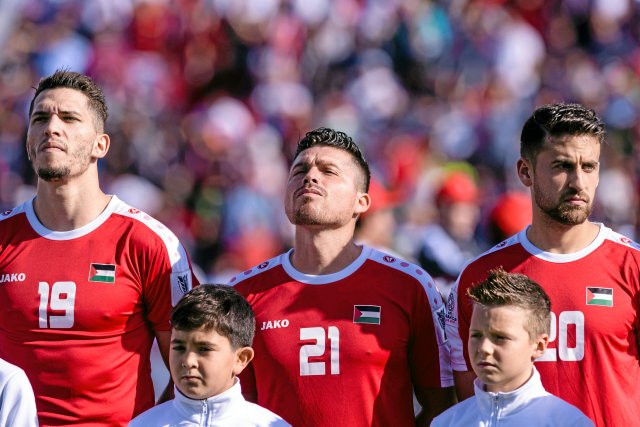Pride and fear: Palestine’s footballers represent their colors at the Asian Championship, Mahmoud Wadi (l.) fears for his family in Gaza.
Foto: imago/Power Sport Images
Every day, Susan Shalabi spends several hours on the Internet and takes countless calls. As vice president of the Palestinian Football Association, she has to document sad news from Gaza. She can confirm that more than 80 footballers have already been killed in the bombings of Israel, including many children. She believes the number of unreported cases is much higher. Almost all of the important stadiums in Gaza have been destroyed, says Shalabi: “People are being deprived of their livelihoods. A regular everyday life, which includes football, will no longer be possible for a long time.
During the telephone interview, Susan Shalabi sits in a café in the Jordanian capital Amman. She is waiting for the border with the neighboring West Bank to reopen. “Even in the West Bank, football is out of the question,” says Shalabi: “Our members are held at checkpoints and can hardly move. Some of them were attacked by Israeli settlers.”
nd.DieWoche – our weekly newsletter

With our weekly newsletter nd.DieWoche look at the most important topics of the week and read them Highlights our Saturday edition on Friday. Get your free subscription here.
The attack on Israel by the terrorist organization Hamas, in which more than 1,200 people were killed and more than 200 kidnapped, and Israel’s military response are fundamentally changing the Middle East. According to Palestinian authorities, around 22,000 people are said to have been killed in Gaza. “The situation is bleak and almost hopeless,” says Shalabi, who has worked as a diplomat and journalist. “But we want to at least try to send a sign of hope.”
The Asian Football Championship begins in Qatar on Friday. Also there: the Palestinian national team, which qualified for the continental tournament for the third time in a row. A remarkable success, says Shalabi, but the players can hardly concentrate on the sport: “A number of them are mourning relatives and friends who were killed in Gaza. We ask them not to spend too much time in front of the television or on social media.
The majority of Palestinian national team players come from the West Bank. Two players, Mohammed Saleh and Mahmoud Wadi, grew up in Gaza. “We wanted to get the family of one of them out of Gaza,” says Shalabi. »We succeeded with the little daughter, but his wife is still in Gaza. The pressure on the player is enormous.” The 21-year-old defender Ibrahim Abuimeir was not allowed to leave Gaza. Despite everything, the team wants to perform well at the Asian Championships.
Palestine is one of the 18 members of Fifa that are not recognized as a state by the United Nations. “What diplomacy denies us, football can offer us,” emphasizes Shalabi. “We can express our national identity in football.” Fifa officially rejects political messages in the stadiums. But at the 2022 World Cup in Qatar, the world association had already tolerated hundreds of fans showing flags and banners for a “Free Palestine”. Support for the Palestinians is likely to become even clearer at the Asian Championships in Qatar. In their first game on Sunday they face Iran, whose regime denies Israel the right to exist.
“Friendly games were held in Qatar to collect donations for Gaza,” reports Mahfoud Amara, who researches football in the Arab world at Qatar University. »Tickets for Palestine are now in demand at the Asian Championships. Many people from Arab countries who live in the Gulf region will express their solidarity at the stadium.
The tournament is probably the biggest challenge for Palestinian footballers to date. Their association was founded in 1962 and admitted to FIFA in 1998. For years, the national team had to play its home games abroad for security reasons, but in 2008 it played against Jordan for the first time in front of home fans in Al-Ram, an Arab-influenced suburb of Jerusalem. The fact that two championships are being played in Palestine, in Gaza and in the West Bank, also symbolizes the political division of the movement between the terrorist organization Hamas and the Fatah party. The president of the football association is long-time politician Jibril Rajoub, who was imprisoned in Israeli prisons for violent crimes in his youth.
Around five million people live in the Palestinian territories. More than twice as many, around twelve million Palestinians, live abroad. “Because of the limited mobility in Palestine, the national team often relied on players who grew up in the diaspora,” explains political scientist Danyel Reiche. There are large Palestinian communities in Jordan and Chile, for example, and their clubs Al Wehdat and Palestino are among the most successful in the country. Of the 25 players on the current national team, four did not grow up in Palestine; the number has never been so low at a tournament. “This shows that Palestine is developing its own players,” concludes the internet portal “Football Palestine.” Ten national players are under contract abroad. Amid Mahajna and Alaa Aldeen Hassan are active at Arab clubs in Israel; Ataa Jaber once even played for Israeli youth national teams.
Football is one of the most visible platforms for power games in the Middle East. Israeli authorities often justified security checks on Palestinian players and searches of their dressing rooms as anti-terrorism measures. And they are reminiscent of 2003, when a youth team in Hebron in the West Bank turned out to be a Hamas recruiting cell. On the other hand, Palestinians are using the six Israeli clubs in the West Bank settlements as an opportunity to demand Israel’s exclusion from FIFA.
Now in times of war, Palestinian football official Susan Shalabi also publishes primarily political news on social media. For example, a video from the Yarmouk Stadium in Gaza, where football has been played since 1938. “We recently renovated the stadium; we wanted to play important games there,” she says. “And now the Israeli military has used this stadium as an internment camp for hundreds of Palestinians.”
#ndstays – Get active and order a promotional package
Regardless of whether it is pubs, cafés, festivals or other meeting places – we want to become more visible and reach everyone who values independent journalism with an attitude. We have put together a campaign package with stickers, flyers, posters and buttons that you can use to get active and support your newspaper.
To the promotional package
